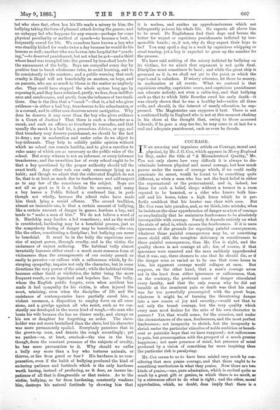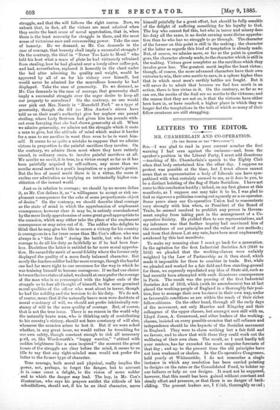COURAGE.
IN an amusing and ingenious article on Courage, moral and physical, by Mr. J. G. Cox, which appears in Merry England for May, under the title of "A Misunderstood Quality," Mr. Cox not only shows how very difficult it is always to discriminate between physical and moral courage, but how much passes under the name of courage which, if we could really, penetrate its secret, would be found to be something quite different, as when a man who has not the least belief in either the supernatural or the preternatural, and is, indeed, too dense for such a belief, sleeps without a tremor in a room reputed to be haunted, or a rider who knows both himself and his horse, takes a high fence which he is perfectly confident that his hunter can clear with ease. But Mr. Cox runs into paradox, and, as we think, into mistake, when he insists on the clear apprehension of danger as a test of courage so emphatically that he maintains fearlessness to be absolutely incompatible with courage. Surely it depends entirely on what the state of mind is, which causes the fearlessness. If it is mere ignorance of the grounds for expecting painful consequences, whatever those painful consequences may be, or something more stolid still, the complete deficiency in sensitiveness to those painful consequences, then Mr. Cox is right, and the quality shown is not courage at all ; for, of course, if that ignorance were removed and the man suddenly apprehended that it was, say, three chances to one that he should die, or if the danger were so varied as to be one that came home to him, his apparent courage would collapse at once. But suppose, on the other hand, that a man's courage arose not in the least from either ignorance or callousness, that on the contrary, the profound sense of danger stimulated every faculty, and that the only reason why he did not tremble at the imminent pain or death was that his mind was far too powerfully preoccupied with the great hope, whatever it might be, of turning the threatening danger into a new source of joy and security,—would not that be not only the truest courage, but the very quality which every man most desires for the sake of his own character to possess ? Yet that would mean, for the occasion, and under the circumstances of the case, fearlessness, and the most perfect fearlessness; not incapacity to shrink, but the incapacity to shrink under the particular stimulus of noble ambition or beneficent or patriotic hope that we have supposed ; not callousness to pain, but preoccupation with the prospect of a much greater happiness ; not mere presence of mind, but presence of mind produced by a vision of something far more inspiring than the particular risk is paralysing.
Mr. Cox seems to us to have been misled very much by considering that men praise courage, and that there ought to be something meritorious in what they praise. Now there are two kinds of praise,—one, pure admiration, which is excited quite as much by a great gift or genius, in which there is no merit, as by a strenuous effort to do what is right; and the other, moral approbation, which, no doubt, does imply that there is a
straggle, and that the will follows the right course. Now, we submit that, in fact, all the virtues are most admired when they excite the least sense of moral approbation, that is, when there is the least necessity for struggle in them, and the most sense of victorious ease and commanding power. Take the case of honesty. Do we demand, as Mr. Cox demands in the case of courage, that honesty shall imply a successful struggle ? On the contrary, the thief in "Never Too Late to Mend" who told his host what a mass of plate he had virtuously refrained from stealing, how he had gloated over a lovely silver coffee-pot, and had, nevertheless, replaced it honestly in the chest under the bed after admiring its quality and weight, would be approved by all of us for his victory over himself, but would never be admired for the marvellous honesty he had displayed. Take the case of generosity. Do we demand, as Mr. Cox demands in the case of courage, that generosity shall imply a successful struggle over the eager desire to keep all our property to ourselves ? On the contrary, no one would ever pick out Mrs. Norris in "Mansfield Park" as a type of generosity, though she did (as Miss Austen's nieces have told us on their aunt's authority) give her nephew one pound sterling, where Lady Bertram had given him ten pounds without even fancying that she had shown generosity at all. When we admire generosity, we admire not the struggle which it costs a man to give, but the attitude of mind which makes it harder for a man to see another in want than even to be in want himself. It seems to us quite a mistake to suppose that we admire virtues in proportion to the painful sacrifices they involve. On the contrary, we admire them most where they have entirely ceased, in ordinary cases, to involve painful sacrifices at all. We ascribe no merit, it is true, to a virtue except so far as it has been painfully acquired by self-culture, any more than we ascribe moral merit to a poet's inspiration or a painter's genius. But the less of moral merit there is in a virtue, the more it excites our admiration as implying an intrinsically higher constitution of the inward world.
Just so in relation to courage ; we should by no means define it, as Mr. Cox defines it, as "a willingness to accept or risk unpleasant consequences for the sake of some proportionate object of desire." On the contrary, we should describe ideal courage as the state of mind in which the apprehension of unpleasant consequence, however clear it may be, is entirely overshadowed by the more lively apprehension of some great good appropriate to the occasion, which may either take the place of the unpleasant consequence or may arise out of it. The soldier who delights to think that he may give his life to secure a victory for his country is courageous in a far truer sense than Mr. Cox's officer, who was always in a "blue funk" during the battle, but who had the courage to do all his duty as faithfully as if he had been fearless. Doubtless the latter is entitled to far more moral approbation. He earned the merit of moral fidelity where the former only displayed the quality of a more finely balanced character. But surely the fearless soldier had far more courage, though the fearful one had far more right to our reverence for the way in which he was training himself to become courageous. If we had our choice between the two states of mind, we sh ould at once prefer the courage of the man who is so preoccupied with the higher ends of the struggle as to lose all thought of himself, to the more germinal moral qualities of the officer who went about in terror, though he had the nobility and the heroism to do his duty. We do not, of course, mean that if-the naturally brave man were destitute of moral constancy of will, we should not prefer intrinsically constancy of will to the mere quality of courage. But, of course, that is not the true issue. There is no reason in the world why the naturally brave man, who is thinking only of contributing to his country's victory, should not have constancy of will also, whenever the occasion arises to test it. But if we were asked whether, in any great issue, we would rather be trembling for our own safety, though constant enough to risk all necessary peril, or, like Wordsworth's "happy warrior," "attired with sudden brightness like a man inspired" the moment the great issues of the struggle are clear before the mind, it seems to us idle to say that any right-minded man would not prefer the latter to the former type of character.
True courage, both moral and physical, really implies the power, not, perhaps, to forget the danger, but to account it in some sense a delight, in the vision of some nobler end to which the danger may lead. The boy, in Mr. Cox's illustration, who says his prayers amidst the ridicule of his schoolfellows, should not, if his be an ideal character, nerve himself painfully for a great effort, but should be fully sensible of the delight of suffering something for his loyalty to God. The boy who cannot feel this, but who in terror and misery does his duty all the same, is no doubt earning more divine approbation than he who has no struggle to go through. The character of the former on this point is still in the making ; the character of the latter as regards this kind of temptation is already made. But, of course, we admire more, so far as the point in question goes, the character already made, to the character which is still in the making. Virtues grow completer as the sacrifices which they involve grow less. The greatest merit implies the least virtue; though, of course, the more advanced characters have their own victories to win, their own merits to earn, in a sphere higher than that in which most men's earthly battles are fought. But it will never do to admit that because we find less merit in an action, there is less virtue in it On the contrary, so far as we can see, the merits of the frail are no merits to the virtuous; and the reason that they are not so, is that the virtuous have either been born in, or have reached, a higher plane in which they no longer feel the temptations in the toils of which so many of their fellow-creatures are still struggling.



































 Previous page
Previous page